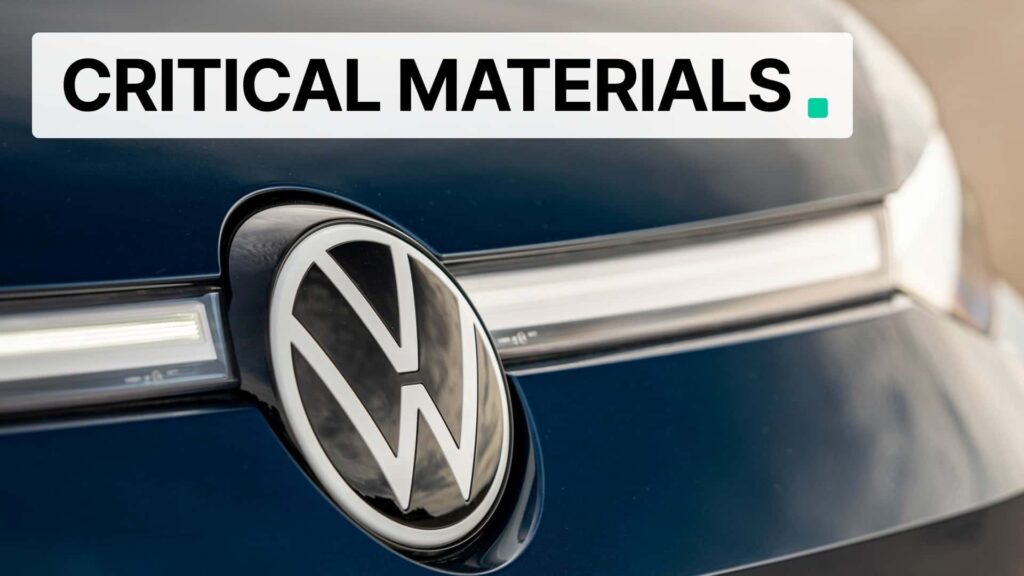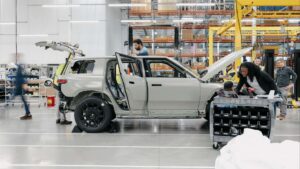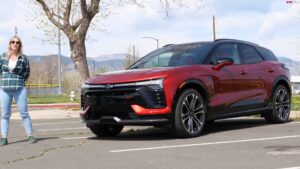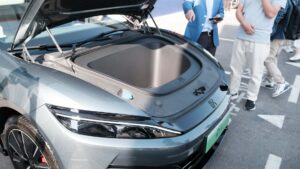
We knew something like this was going to happen. But now we know the numbers. After more than a year of operating in an unprecedentedly tough environment in Europe and China, things came to a head for the Volkswagen Group this week as it posted its third-quarter financial results. And there’s certainly a path forward for one of the world’s largest automakers, but it will not be an easy one.
The continued Euro-pocalypse is the focus of today’s Critical Materials roundup of tech and mobility news. Be sure and sign up for updates too as we get ready to bring it to your inbox as well soon. Let’s dig in.
30%: VW’s Q3 Earnings Hit Pandemic Levels Of ‘Uh-Oh’

Volkswagen ID.7 in Germany
We’ve spent much of the past few months covering this “toxic cocktail” facing the VW Group and Stellantis in particular. Ultra-high interest rates, eroding market share in China, high costs to make electric vehicles that can meet the future (and future emissions regulations) and intense competition on their home turf from Chinese newcomers have combined to make life extremely hard for Europe’s biggest automakers.
VW announced today that those factors—plus the need to invest in those future electric models to stay competitive—are why its operating profit went down 42% in Q3. And as we reported on Monday, VW is now looking at plant closures for the first time ever in its native Germany.
Here’s some analysis from Automotive News today:
Group profits were hit by a weak performance at the VW brand, along with high costs in its German home market and investments in new models.
VW said the results reinforce the need for drastic measures in Germany, where labor leaders are resisting the potential closure of at least three factories and the elimination of thousands of jobs. The company is also looking to reduce wages for around 140,000 workers by 10 percent.
The core VW brand — where much of those cuts would fall — earned a 2.1 percent operating margin in the first nine months, compared with 3.4 percent in the same period last year.
“This highlights the urgent need for significant cost reductions and efficiency gains,” VW Group Chief Financial Officer Arno Antlitz said during an earnings call on Oct. 30.
“VW never had really high margins over the course of times, but these are different times,” Antlitz said. “VW is not earning the money it needs to spend for all the new products.”
He said the automaker has spent €4.9 billion on development and investments for the EV transition, bringing down VW brand’s earnings to €1.3 billion by the end of September.
I don’t doubt this will be framed in some sectors as “look what the EV transition is doing to the auto industry.” And it’s true that pivoting to batteries and software is proving endlessly more costly and difficult than when automakers like VW assumed they could pull it off about a decade ago now. But for most companies, the playbook goes like this: finance those expensive EV and battery investments with strong sales of the current gas-powered cars. It’s how General Motors is, perhaps ironically, paying for its EV transition with Escalades and Silverados.
But in VW’s case, the entire European new car market has shrunk amid rising costs, people aren’t buying EVs there after subsidies disappeared and the competition is both cheaper and better than ever. If it’s not moving its current metal, then Anlitz is right: it can’t invest in the future. And that isn’t an option.
What is an option is aggressive cutting to make labor and factory costs more competitive across the board, which is one of VW’s biggest challenges. Yet that’s going to be a horrible situation for the actual workers at VW’s various brands, thousands of whom could lose good-paying, highly protected jobs with great benefits.
Antlitz said that the VW brand—just the core brand, not even the wider group—needs to cut more than €10 billion (about $11 billion) in cost savings to stay competitive with its peers. And it’s got to meet Europe’s aggressive new CO2 targets that will basically require an end to internal combustion. Can VW survive this current moment? Probably, but getting there is going to be painful.
60%: Audi To Close Brussels Plant After All

It’s not just the core VW brand that’s having trouble, though. Audi is doing some really impressive things in the EV space but it’s still going to be on the receiving end of the first VW Group plant closure in decades.
This would be the Brussels, Belgium plant which, for the last few years, has only made Audi’s Q8 E-Tron and Q8 E-Tron Sportback (formerly just called the E-Tron.) And I’m not surprised as to why. The Q8 E-Tron was a groundbreaking car when it first arrived—it predates the Tesla Model Y, believe it or not—but it’s expensive and not as competitive as it once was. Sales have tanked as of late.
The new Q6 E-Tron, with better range, tech and pricing, should do better for the brand. But it does mean the Brussels plant is getting the axe.
As recently as a month ago, it seemed like Audi might find a buyer for that plant, possibly even a Chinese automaker. The European mobility publication Electrive reports that didn’t work out:
The successor to the Q8 e-tron will be manufactured in Mexico, and Audi will not award any new models to the Belgian plant. As some German sites within the VW Group are now also on the brink of collapse, the chances for Brussels – even with another Group brand – have diminished further. In mid-September, Audi’s Chief Operating Officer Gerd Walker stated in an interview that the company was focussing on the search for potential investors.
Around a fortnight ago, Audi then announced that it had been unable to find a suitable investor for Brussels, which led to the scenario of a plant closure materializing. There were probably 26 interested parties and potential investors, but according to Walker, they were unable to present a “viable and sustainable concept” for the future of the factory. An internal search within the Volkswagen Group for future car production or alternative uses for the plant had also remained unsuccessful.
So between this and likely plant closures in Germany, you get why it’s a four-alarm fire over there.
90%: The EU Doesn’t Take This Lying Down

Photo by:
Photo by: InsideEVs
So what’s the European Union supposed to do here? Let scores of jobs go by the wayside (the VW Group employs 300,000 people in Germany alone, for example) while MG, BYD, Nio and Xpeng come in and snatch up all the business?
In a word: non. Here come the tariffs, hotter than a baguette fresh out of the oven and hitting every company that builds electric cars in China and exports them to Europe. From Reuters:
The European Union has decided to increase tariffs on Chinese-built electric vehicles to as much as 45.3% at the end of its highest-profile trade investigation that has divided Europe and prompted retaliation from Beijing.
Just over a year after launching its anti-subsidy probe, the European Commission will set out extra tariffs ranging from 7.8% for Tesla to 35.3% for China’s SAIC, on top of the EU’s standard 10% car import duty.
The Commission, which oversees EU trade policy, has said tariffs are required to counter what it says are unfair subsidies including preferential financing and grants as well as land, batteries and raw materials at below-market prices.
It says China’s spare production capacity of 3 million EVs per year is twice the size of the EU market. Given 100% tariffs in the United States and Canada, the most obvious outlet for those EVs is Europe.
The new tariffs go into effect next week and may have a profound impact on car pricing in Europe. More on this as we get it, including the impact on EV pricing in Europe. The U.S. currently has 100% tariffs on EVs made in China, but that barely affects any cars currently on sale, beyond the Polestar 2 or the upcoming Volvo EX30, which are moving production to Europe to get around that problem. Europe, however, has tons of Chinese brands and Chinese-made EVs right now; I’ll be very curious to see how prices spike.
Interestingly, Germany was against the tariffs because its car companies still have to do business in China, such as it is these days.
100%: What Do The European Auto Industry’s Problems Mean For The U.S.?

I suppose at least some of the answers to that question will be determined by who wins the election next week, though neither former President Donald Trump nor Vice President Kamala Harris seem terribly inclined to back off on anti-China car tariffs. But what does this situation in Europe mean for the U.S., too? Is this part of the world insulated enough from China’s increasing dominance in the space, or is it a preview of what’s to come?
Contact the author: patrick.george@insideevs.com



